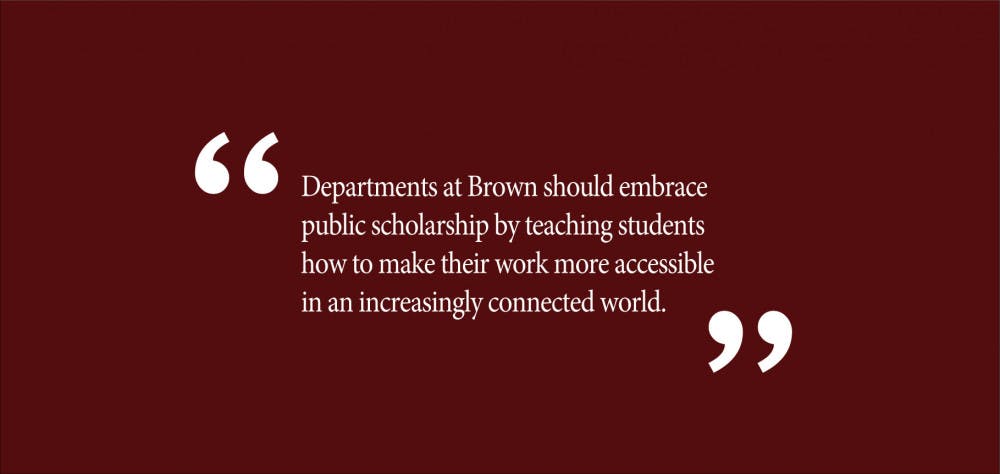In an era rife with accusations of and reactions to “fake news,” engagement between scholars and the public is crucial for sharing and correctly interpreting research. But public scholarship — and communicating research to the public — has never been a priority for academia, which has instead emphasized old-fashioned methods of publication targeted only at other academics. Departments at Brown should embrace public scholarship by teaching students how to make their work more accessible in an increasingly connected world.
There are many different ways to be a public scholar; almost all of them involve sharing research and interests with people not just outside of a particular field, but outside of academia altogether. Previously this task has often fallen to journalists, who translate academic jargon into a digestible news language. But this model has been changing with the creation of popular scholarly online magazines — like Lady Science, Nursing Clio and Eidolon — that retain the rigor of peer review but publish pieces with a broad audience in mind. This model bridges the gap between the ponderous, old-fashioned print journal publications and the unrigorous personal blogs of the early internet. It’s about bringing information more quickly to a wider, digital audience.
Thanks in no small part to the preponderance and dissemination of social media apps, a lot of networking that used to happen behind closed doors in academia now takes place online. Twitter exchanges can now foster intra- and cross-disciplinary work at universities, a shift away from bureaucratic allegiances between academic departments. We should embrace this public academic life as a way of providing students with as many opportunities as possible. And in order to embrace it, students should be provided with adequate training.
Writing for a public audience can help students hone their academic writing skills by focusing on how to present information and avoid jargon for the sake of jargon. It can also help by forcing students to further evaluate their arguments in order to explain them with clarity. This isn’t a matter of dumbing down a topic, necessarily, but rather of ensuring that there are no gaps in the information presented and no assumed niche knowledge. Public scholarship therefore becomes an exercise not just in writing but in argument-crafting and research.
Writing for public venues also affords students additional opportunities for feedback on their writing, research and scholarship. Most of us rarely get an opportunity to respond to feedback on our writing for classes — we get feedback from professors but never the chance to make changes. Public scholarship can involve pairing writers with editors, providing the opportunity for students to respond to critique productively and to modify their writing based on feedback. I know from personal experience that this has helped me not only as a writer but also as a scholar, and has certainly made it easier for me to productively receive criticism on my academic work.
Engaging in public scholarship also prepares students for careers outside of academia. Writing in a professional setting, from journalism to tech documentation to annual reports, privileges a style so different from academic writing that it requires different training. Work on translating research for a public audience can provide this training. Explicating jargon, being quick and clear with a thesis and walking through arguments are hallmarks of public scholarship and valuable for other professional writing as well. Providing students with training in this type of writing will therefore prepare us for additional career options and opportunities.
Brown does offer some ways in which students can train in and engage with public scholarship. The Public Humanities program offers courses in public scholarship. The Writing Center provides general training in writing, although not specifically public-focused writing. Additionally, groups like the Brown Daily Herald provide training in non-academic writing and a platform to publish it. I’m also helping organize a platform called the Ratty, which will provide training in public scholarship for graduate students at Brown.
But while these departments and groups serve an important function, they are all opportunities that we students must seek out on our own. We have to recognize the importance of public scholarship and then use our spare time to work with the Ratty or take classes in the Public Humanities program. Treating public scholarship as somehow “extracurricular,” as an addition to — or a distraction from — our regular studies, means that many students who are unable to devote extra time will never receive this training. Incorporating public scholarship as a priority within departments, requiring coursework or participation in writing programs and allowing students to engage in public scholarship as a part of their expected academic work would provide better training for students and improve our opportunities both in academia and beyond.
E.L. Meszaros GS can be reached at e.l.meszaros@brown.edu. Please send responses to this opinion to letters@browndailyherald.com and op-eds to opinions@browndailyherald.com.





